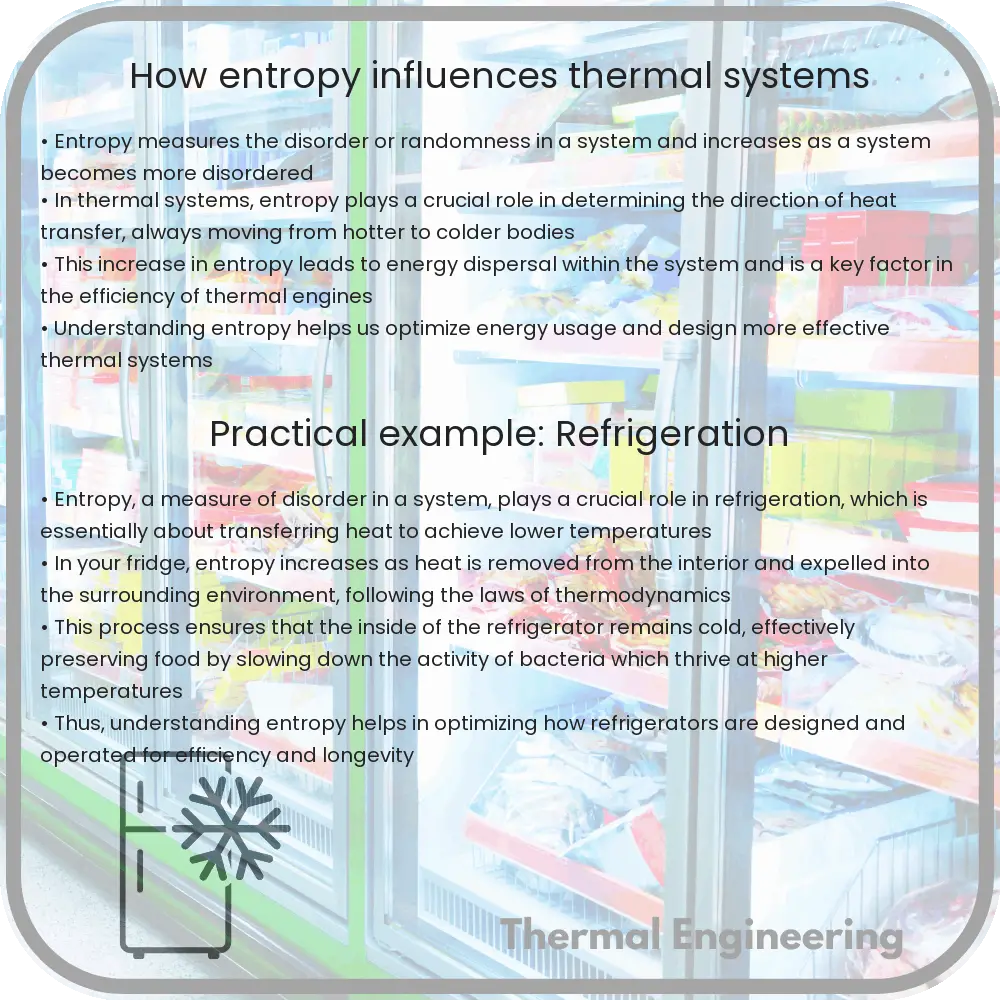Learn how entropy, a key thermodynamics concept, impacts the efficiency of thermal systems like heat engines and refrigerators.

Understanding the Role of Entropy in Thermal Systems
Entropy is a fundamental concept in thermodynamics, often associated with the level of disorder or randomness in a system. In the context of thermal systems, which include engines, refrigerators, and other heat-transfer devices, entropy plays a crucial role in determining system efficiency and directionality of heat flow. This article explores how entropy influences these systems and underscores its importance in engineering design and analysis.
What is Entropy?
Entropy, denoted by the symbol S, is a measure of the disorder or randomness in a system. The second law of thermodynamics states that in an isolated system, entropy can never decrease over time. This law implies that natural processes are irreversible and tend to lead to an increase in entropy. In practical terms, this increase dictates how energy is transferred and transformed within thermal systems.
Entropy in Heat Engines
Heat engines are devices that convert thermal energy into mechanical work. Examples include steam turbines and internal combustion engines. The efficiency of these systems is heavily influenced by entropy changes. During operation, a heat engine absorbs heat from a high-temperature source, converts part of it to work, and expels the remaining heat to a lower-temperature sink.
The change in entropy associated with heat transfer from the hot source to the engine and then from the engine to the cold sink explains the inherent inefficiencies in these systems. According to the increase of entropy principle, the total entropy of the universe increases with the operation of a heat engine, leading to less energy available for work as more energy is dispersed in the form of heat.
- The efficiency of a heat engine, defined as the ratio of the work done by the engine to the heat absorbed from the source, is constrained by the increase in entropy. Mathematically, it can be expressed as:
\[ \text{Efficiency (η)} = 1 – \frac{T_{cold}}{T_{hot}} \] where \(T_{cold}\) and \(T_{hot}\) are the absolute temperatures of the cold sink and hot source, respectively. - Design improvements in heat engines often focus on minimizing entropy generation to enhance efficiency.
Entropy in Refrigeration and Air Conditioning Systems
Refrigeration and air conditioning systems are essentially heat engines operating in reverse. These systems extract heat from a cooler place and expel it to a warmer place, with the aim of cooling the environment. The role of entropy in these systems is similarly crucial in determining their efficiency and effectiveness.
In refrigerators and air conditioners, the refrigerant absorbs heat from the interior, resulting in reduced entropy locally, but the compressor expends work to expel heat to the outside environment, thereby increasing the overall entropy of the universe. This also illustrates why these machines require external energy (electricity) to perform their functions.
- The Coefficient of Performance (COP) of these systems, a measure of their efficiency, is influenced by the entropy changes during the heat transfer and compression processes. The COP can be defined as:
\[ \text{COP} = \frac{Q_{cold}}{W} \] where \(Q_{cold}\) is the heat removed from the cold reservoir and \(W\) is the work input to the refrigerator.
Conclusion
Entropy is more than just a theoretical concept; it has real-world implications in the way thermal systems operate and the limits to their efficiency. By deepening our understanding of entropy and its changes within these systems, engineers can design more efficient and effective devices, thus saving energy and reducing the environmental impact associated with energy use. In the wider context, understanding entropy allows a greater insight into the fundamental laws that govern all types of energy transformations in nature.
As we continue to develop and refine thermal systems, entropy will remain a cornerstone of thermodynamic analysis, guiding innovation towards more sustainable and economically feasible solutions.